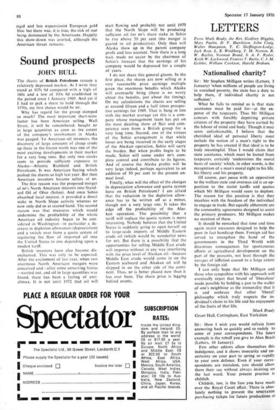Sound prospects
JOHN BULL
The shares of British Petroleum remain a relatively depressed market. As I write they stand at 107s 9d compared with a high of 160s and a low of 100s 6d established in the period since 1 January 1969. And yet if I had to pick a share to hold through the 1970s, my first choice would be Bp.
Why has regard for the group slumped so much? The most important short-term factor has been American selling. Wall Street, it will be remembered, bought BP in large quantities as soon as the extent of the company's involvement in Alaska was gauged. To American oil investors, the discovery of large amounts of cheap crude up there in the frozen north was one of the most exciting developments in their market for a very long time. But only two stocks seem to provide sufficient exposure to Alaska—Atlantic Richfield and British Petroleum. It was American buying which pushed the shares so high last year. But then American investors became sellers of BP.
The first reason was the proposed merger of BP's North American interests into Stand- ard Oil of Ohio (Sohio). And once Sohio absorbed local interest, it provided a direct stake in North Slope activity whereas BP now only did so at second hand. The second reason was that measures which would undermine the profitability of the whole American oil industry began to be con- sidered in Washington—in particular a de- crease in depletion allowances (depreciation) and a switch over from a quota system of regulating the flow of imported oil into the United States to one depending upon a modest tariff.
British investors have also become dis- enchanted. This was only to be expected. After the excitement of last year, when two enormous North American mergers were conceived and—after some unnerving hiatus —carried out, and oil in large quantities was found, there has been a feeling of anti- climax. It is not until 1972 that oil will
start flowing and probably not until 1973 that the North Slope will be producing sufficient oil for BP'S share stake in Sohio to rise above 50 per cent (the merger is geared to oil production). Only then will Alaska show up in the parent company profit and loss account. Now there is a long wait, made no easier by the chairman of Sohio's forecast that the earnings of his company would be depressed for a couple of years.
I do not share this general gloom. In the first place, the shares are now selling at a very reasonable price earnings multiple given the enormous benefits which Alaska will eventually bring (there is no worry about the benefits, just about the timing). On my calculations the shares are selling at around fifteen and a half times prospec- tive earnings for 1969. That is bang in line with the market average yet this is a com- pany whose management team has put on the most dazzling show of flair and com- petence seen from a British group for a very long time. Second, one of the virtues of the Sohio arrangement is that while losses are being incurred in the early stages of the Alaskan operation, Sohio will carry the burden. But when profits begin to be made, Sohio will come under BP'S com- plete control and contribute to its figures. And of course the Alaska profits will be very large indeed, perhaps equivalent to an addition of 50 per cent to the present an- nual level.
Finally, what will the effect of the changes in depreciation allowance and quota system have on British Petroleum? I am afraid that the reduction- in the depletion allow- ance has to be written off as a minus, though not a very large one. It takes the edge off the profitability of the Alas- kan operation. The possibility that a tariff will replace the quota system is more interesting. Nobody believes that the United States is suddenly going to open herself up to large-scale imports of Middle Eastern crude oil (which would be wonderful news for BP). But there is a possibility that the opportunities for selling Middle East crude will improve without in any way interfering with the price level of Alaskan oil—because Middle East crude would come in on the Eastern seaboard and Alaskan oil will be shipped in on the other side of the conti- nent. Thus, BP is better placed now than it has ever been. The share price is lagging behind events.


































 Previous page
Previous page